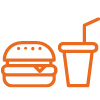|
View this email in your browser
|

|

|
What Does Food Insecurity Look Like?
Last week's email addressed what is food insecurity and the impact it has on our community and health. In this email, we take a look at the compromises and coping strategies people often use when dealing with food and nutrition security.
Compromises and Coping Strategies
According to the 2014 Hunger in America study conducted by the Feeding America Network, this is how people make choices, compromises and employ coping strategies when faced with limited resources:
 69%
Had to choose between food and utilities.
|
 66%
Had to choose between food and medical care.
|
 57%
Had to choose between food and housing.
|
 31%
Had to choose between food and education.
|
 79%
Purchase inexpensive, unhealthy food.
|
 53%
Receive help from friends or family.
|
 40%
Water down food or drinks.
|
 35%
Sell or pawn personal property.
|
|
|
|
Did you know?
While it may be difficult to read the bulleted list below, it's important to understand what someone who is dealing with food and nutrition insecurity may be experiencing:
- Consistently eating the same low-cost foods and feeling like you need to compromise the types of food you eat to save money.
- Eating less than you would like to or less frequently than you prefer to save food or money until you can get more.
- Skipping meals or whole days of eating because you have run out of food and do not have the money or resources to get more.
- Not going out to restaurants with coworkers.
- Drinking a lot of water to cope with food insecurity.
- Visible weight loss.
- Sleeping to cope with food insecurity.
|
|
|
Need help?
- Food Gatherers is an anti-hunger program that serves Washtenaw County and has a large network of partners to provide direct food assistance to community members. Those in need can type in their address to find the closest food resource on the Food Map. You can also call them for further information at 734-761-2796.
- Gleaners Community Food Bank hosts drive-up Community Mobile Distributions that follow a two-week rotating schedule with the goal of providing nutritious, healthy food in five counties: Livingston, Oakland, Wayne, Monroe and Macomb.
|
|
|
Want to help?
- Feeding America – Raise your awareness by learning more about food insecurity from Feeding America, the largest charity working to end hunger in the United States.
- Resource Coach Program – The MHealthy Resource Coach Program offers support to U-M faculty and staff experiencing a financial crisis or other personal hardship. Assistance comes in the form of case management services, connections to community and local resources, and in some cases, financial support for employees experiencing a financial crisis or other personal hardship. Donations go directly to funding the need-based mini-grants for U-M faculty and staff.
- Maize and Blue Cupboard – Support MBC by donating goods, funds or volunteering your time. To make a food or good donation, drop off directly to the MBC. Donation bins are also available throughout the month of September in university units and departments across campus. Contact your Champion to see if there is a donation bin in your area.
|
|
|
|
|



